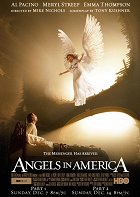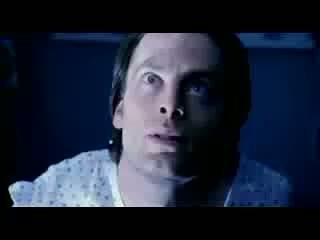Director:
Mike NicholsCámara:
Stephen GoldblattMúsica:
Thomas NewmanReparto:
Al Pacino, Meryl Streep, Emma Thompson, Mary-Louise Parker, Jeffrey Wright, Ben Shenkman, Patrick Wilson, James Cromwell, David Zayas, Michael Gambon (más)Streaming (1)
Episodios(6)
Sinopsis(1)
The series follows a sprawling group of characters as they navigate their way through the cutthroat New York City of the 1980s, when AIDS began to rear its ugly head. Getting sicker by the minute, Prior Walter is abandoned by his tormented lover, Louis (Ben Shenkman); deluded lawyer Roy Cohn (Al Pacino) is visited by Ethel Rosenberg (Meryl Streep), a woman he helped to condemn; and the pill-popping Harper (Mary-Louis Parker) is on the verge of losing her sanity when she realizes that her husband, Joe (Patrick Wilson), is a closet homosexual. (texto oficial de la distribuidora)
(más)Reseñas (3)
For some this is already outdated within but a few years of its creation, but for me, who let one of the most famous original HBO projects lie idle for fifteen shameful years, it's still relevant, still alive, still addressing topics that will never age. And it doesn't matter who is in power, who has to be ashamed to admit their sexual orientation, or who has to hear any fatal diagnosis from a doctor. Some people will always be cold and unapproachable, while others will be supportive, believing, and full of hope. At least, I hope so. The series itself is, in my eyes, an incomparable illumination with a torch carried by my forever beloved Al Pacino, the enchanting Mary-Louise Parker, and the meteoric and passionately burning Justin Kirk. I feel sad for all the lost souls, for all the forgotten angels, for all the viewers who condemn Mike Nichols' (and especially Tony Kushner's) opus as boring or shameful, and last but not least, I am sad that even though Angels in America belongs to this century in terms of its release year, I have an inexplicable fear that such spectacles are no longer made today. Race, taste, and history finally overcome. And you ain't there.
()
The majority of books, films, and television shows are created with the intention to entertain and do not have any higher goals. However, occasionally a work appears that clearly has higher ambitions and aims to capture the atmosphere and significant movements in a certain country, era, or social class. Angels in America not only has such ambitions but successfully manages to fulfill them. Through its characters, it transports us back to the United States in the mid-1980s, when the conservative Reagan revolution was at its peak and the AIDS epidemic was fully erupting, primarily affecting members of the homosexual minority. This minority traditionally concentrated in large liberal cities in the eastern region. The series portrays the lives of several gay individuals who cope with either their own illness or the illness of their friends and intimate partners. They experience frustration from the radicalized social atmosphere and concerns about the future. Well-written, directed, and performed, Angels rightfully earned several significant professional awards. The series also includes a mysterious storyline; however, it is secondary and certainly does not mean that this series can be classified in the same category as Lynch's works or entertaining fantasy series. Angels is unique in that the series, justifiably, did not have the kind of commercial success that would force the creative team to squeeze out further sequels. Angels is not for everyone, but those who appreciate quality and provocativeness will truly enjoy this story of angels coming to our world, which constantly oscillates between subtle irony and the tragedy of gradual decay and dying. Overall impression: 95%.
()
Angels in America is a series adaptation of the famous 1993 stage play. Tony Kushner's play won the Pulitzer Prize (an award given for new works of art significant to American culture, now transcending literary genres, a tradition since 1917). Which explains a lot. The lead acting trio of Al Pacino, Meryl Streep, and Emma Thompson is great and beyond their typical casting. Even the young actors proved that they were well chosen. Their other work has found success, for example, on Showtime. The subject matter is really dense, linking AIDS sounding the alarm across the gay community with the question of the religious identity of Mormons outside their home state of Utah. It really pays to have a grasp of modern US history, because otherwise, you will have absolutely no idea what this is all about. On the other hand, it's so crazy that you can't be sure of anything. However, there is one major flaw in it. There's virtually no reference to the fact that this all takes place in the mid-1980s and only the final epilogue specifies the time period to five years later, 1990, which is simply inconsistent. The discourse around AIDS has been different in each decade and we need to be aware of the shift in time.
()

